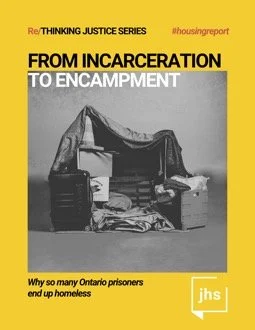By Safiyah Husein, Capryce Taylor, Jacqueline Tasca, Meaghan Costa, Reza Ahmadi
John Howard Society of Ontario
“At least 10% of Ontario’s homeless population went directly from an Ontario jail to life on the streets.”
This report outlines actionable recommendations and best practices to reduce homelessness among individuals with experiences of incarceration. The insights provided are based on comprehensive discussions with people with lived experience, housing providers, community service agencies and policy professionals.
Kingston: John Howard Society of Ontario, 2025. 36p.




